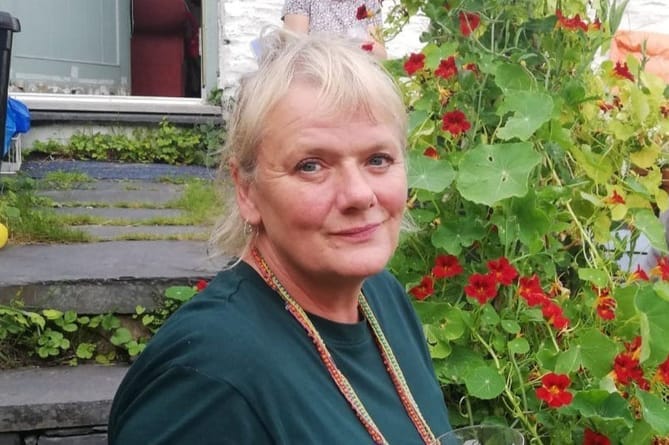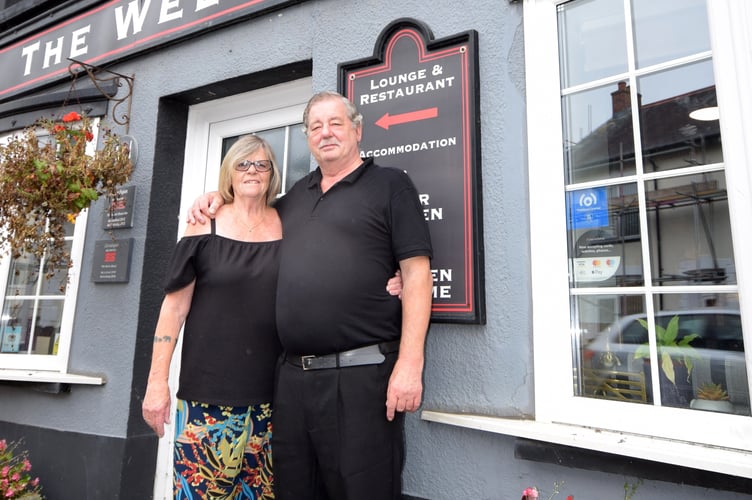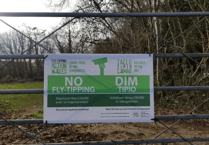6pm, 20 March, 2020. Chances are you remember exactly where you were and what you were doing at that moment when Welsh First Minister Mark Drakeford announced the first nationwide lockdown because of Covid 19.
What followed was the greatest peacetime challenge faced by governments globally since the Second World War, leaving an indelible scar on the collective psyche of Wales in a public health emergency that claimed more than 236,0000 lives across the UK.
Four years on, families are still coming to grips with the loss of loved ones who during the pandemic, businesses are still rebuilding from the economic hit of a year of living through restrictions, and working and shopping habits have been reshaped.
And four years on, the UK Government’s public inquiry into the coronavirus pandemic is now looking at how Wales, its Government and officials, responded to the unprecedented challenges posed by Covid-19.
One Machynlleth woman whose father died from the virus caught at a care home in Aberystwyth, says her trust in elected representatives to look after people in Wales has been broken.
Catherine and her late father, Harry, are originally from Dinas Mawddwy in Gwynedd.
Harry was living in a Hafan y Waun in Aberystwyth when the pandemic hit. He died from Covid in November 2020.
Since his death, Catherine has become a vocal advocate for a full Covid-19 inquiry for Wales. And right now, even as she prepares evidence for the care home module of the inquiry, she says the current inquiry doesn’t do justice to the people of Wales.
“Of course there isn’t time for the scrutiny that the people of Wales deserve and need, however I am grateful that it has come to Wales,” she said. “Our group, Covid-19 Bereaved Families for Justice Cymru, had several meetings with Mark Drakeford requesting a Wales only inquiry. He denied us but said he’d reconsider if Wales didn’t get the scrutiny it deserves
“But what we’ve seen so far in Cardiff is that Wales really does need its own inquiry.
“It’s not possible for huge inquiries like this to do a deep dive of what went wrong in Wales and how to put it right, and I will repeat again that the health, wellbeing and social care of the people in Wales is devolved to the Welsh Government and they are the ones in charge of that.
“The other thing I’ve noticed from the proceedings in Cardiff is why the Welsh Government refused a Welsh inquiry.
“There have been some shocking and startling revelations.
“We knew already but it’s now come out that there wasn’t adequate PPE in Wales.
“Also, we know the Welsh Government deliberately sent patients from hospitals to care homes with Covid and a document submitted and presented to the inquiry says that. We also know that from our own lived experience with our families.
“Finally we’re being heard but the module can’t scrutinise in the way it should.”
According to Mary Wimbury, a social care champion in Wales, care homes in Gwynedd and Ceredigion felt as if they were caught up in a nightmare “experiment” when Covid-19 struck in 2020 and the crisis deepened by the day.
Ms Wimbury spoke as the public inquiry moved to Cardiff for the Welsh phase of the investigation.
In the early stages, Ms Wimbury said, protecting the National Health Service had been treated as the paramount priority while social care hadn’t been given enough consideration.
One of the catastrophic consequences was that admitting untested hospital patients into care homes had in some cases led to the virus spreading rapidly, leading to the deaths of many vulnerable elderly residents.
In the three-year period from January 2020 there were nearly 1,500 excess deaths in care homes in Wales.
The lack of a rigorous testing regime early on and shortages of personal protective equipment like face masks, gloves and aprons had contributed to the problems.
On the other hand the Welsh Government had adopted a more cautious, considered approach than the UK Government and only announced new infection control measures when the necessary infrastructure had been put in place.
Financial support provided by the Welsh Government for the social care sector was also significantly higher in Wales than in other parts of the UK.
Ms Wimbury said: “During those early weeks, we were talking to our counterparts in care associations across the United Kingdom and I think all of us felt the focus was very much on the NHS and there wasn’t sufficient focus on care homes in particular.
“We felt more planning could have been done in advance in relation to the different types of pandemics and how we would react to them.
“It’s definitely the case we were pressing for testing in particular for people being admitted to care homes from hospitals before that was implemented.
“While testing was announced earlier in England but we were also hearing from counterparts in England was that, although it had been announced, it wasn’t necessarily happening on the ground because the infrastructure wasn’t there.
“One of the differences we saw during the pandemic was that Welsh Government wanted to get the logistics in place before announcing something.
“Testing was absolutely crucial and what we were hearing from members across Wales in the early days was that they were being put under pressure by the NHS to admit people without testing.
“We know that testing would have helped but we also know that in the early stages when people were incubating Covid they wouldn’t have necessarily tested positive. It would have helped in some cases but not in all of them.
“At the time it felt very much like we were living in an experiment and we were finding out about the disease as we went along.
“It was the sector’s worst possible nightmare because the virus was most dangerous to frail elderly people
“We started asking questions in February 2020 about preparations in terms of the care sector and it became clear in the early days of the pandemic in the March that we needed an extension of testing and access to sufficient PPE for staff working in the social care sector, as well as funding to implement the infection control measures that were necessary.
“There were gradual steps as different measures were introduced. Initially, we go the extension of testing for new admissions to care homes and for symptomatic care home residents.
“At the start there was a rule that you could only test five people in a care home and once you had five tests you couldn’t have any more. Clearly, that didn’t make sense going forward.
“Then we moved on to testing all staff and residents when there was an outbreak and finally to all residents and staff being tested regularly.”
“What the inquiry gives us an opportunity to do is to think about what could have been done better in advance so that, heaven forbid, if we were to have another pandemic in future we can be better prepared.”
In Bow Street in Ceredigion, Janet and Clive Gale had just fulfilled a life-long dream of opening a pub. On March 16, they took over the lease of the Welsh Black, a popular watering hole and eatery on the main road north to Machynlleth from Aberystwyth.
They remember exactly where they were when First Minister Drakeford took the unprecedented stop of shutting down the nation for the rapidly spreading public health emergency.
“We signed the lease on 16 March 2020,” explains the affable Clive. They spent a few days painting it and getting the Welsh Black the way they wanted after the previous landlord left it in a bit of a state.
By Friday they were ready to begin their new careers as landlord and landlady, and were looking forward to welcoming friends and clients to the pub.
“We opened the doors on Friday, 20 March at 4pm,” Clive said.
“At 6pm, they announced the lockdown, and at 10pm we closed again for six months.”
Just six hours trading for months before things slowly began to open up.
The irony is that the inquiry in Cardiff has now been told that Mr Drakeford and his Cabinet – along with senior officials responsible for running Wales – never expected to have the powers or control that they did. They were expecting 10 Downing Street and Westminster to run the show.
The Welsh government expected the Boris Johnson-led UK government to make the key decisions during the pandemic
The evidence from Prof Dan Wincott from Cardiff University to the inquiry suggests that prior to 20 March, the working assumption for Cardiff Bay was that the UK government would be making the big decisions under civil contingency legislation.
However, it soon became clear those laws couldn't be applied, and so health legislation was used instead. And because health is a devolved responsibility, Mr Drakeford and his ministers had to take control.
By May 2020, it became clear that Mr Drakeford's government wanted to ease restrictions at a far slower pace than over the border in England, the inquiry heard. And by October, Cardiff Bay was emboldened to launch its own lockdown without co-ordinating with other parts of the UK.
The pandemic is now seen by some as the time when devolved government in Wales came of age.
Whether true or not, things could have been very different if the Welsh government had not been put in charge.
An email shown to the inquiry revels how, a day after the first lockdown in March 2020, then Health Minister Vaughan Gething sent himself a message spelling out concerns by frontline staff.
It read: "Complete chaos at our hospital. No protection for nurses, very low morale… masks not being released".
Vaughan Gething, who's now running to be Welsh Labour leader, was health minister for much of the pandemic
Underneath, in brackets it reads "from at consultant at PCH" which we believe was Prince Charles Hospital in Merthyr Tydfil.
The Welsh government has always insisted that it did not use informal messaging systems for making decisions. However, that may be difficult to prove when some of the messages have disappeared.
Mr Gething had his WhatsApp set to delete messages automatically after a certain period of time
The inquiry has heard claims that Welsh government senior special advisers "suspiciously and systematically" deleted communications - and requests were sent to clear out WhatsApp chats at the end of every week.
It was also told that Mr Gething turned on a disappearing messages function which meant his communication would be deleted by default.
Charities representing those who have lost loved ones to the virus and those still struggling with long Covid have called on the Government for more support.
The first reported death due to Covid-19 in the UK was reported on March 5, 2020. Since then, 230,626 deaths have been recorded up to December 2023, the final data update of the Government’s coronavirus dashboard.
In Ceredigion, 185 people died due to the virus.
It meant the area had a coronavirus death rate of 254 per 100,000 people – below Wales's overall death rate of 384 per 100,000 people.
In Gwynedd, 304 people died from Covid-19, with a death rate of 243. In Powys, 466 people died due to the virus.
Rivka Gottlieb, spokesperson for Covid-19 Bereaved Families for Justice UK, said: "Over 230,600 people have now died from Covid-19 in the UK, often in awful circumstances and with their loved ones unable to be at their side as they passed away.
"This appalling number of deaths was not inevitable; adequate PPE and testing, a swifter lockdown and properly funded services would have saved thousands of lives."
She added: "The awful truth is very little has changed since the pandemic first hit the UK, and if a new disease struck tomorrow we would be just as poorly prepared and likely repeat many of the same mistakes."







Comments
This article has no comments yet. Be the first to leave a comment.